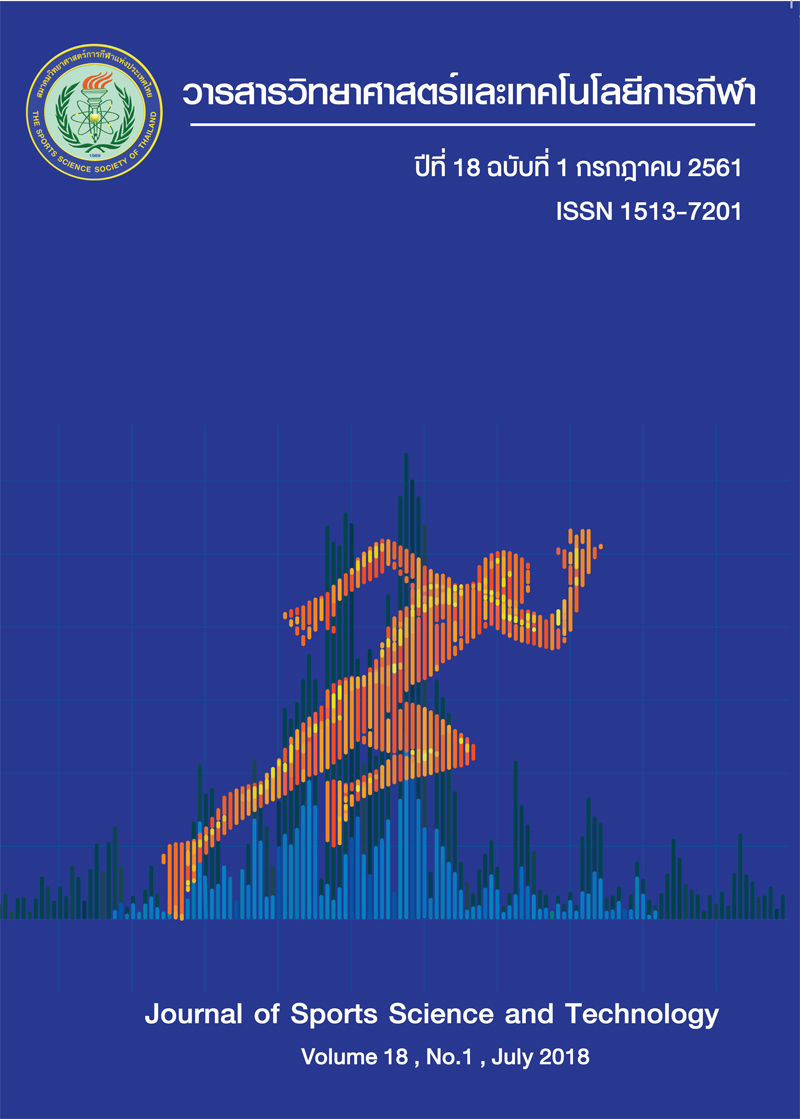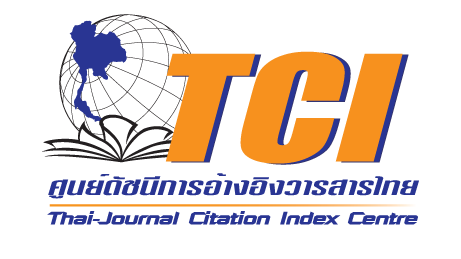STUDY OF A 5-MINUTES COLD-WATER IMMERSION AT KNEE LEVEL DURING HALF TIME OFFICIAL MATCH ON RECOVERY PERFORMANCE OF FOOTBALL PLAYERS IN THE HOT WEATHER
Keywords:
Cold water immersion knee level / Recovery / Heat Weather / Blood lactate concentrationAbstract
Games football are played in the hot weather, leading to further decreases in athletes performance. Therefore, a strategy to reduce core temperature during half time for safe time and coaches which able to use time during simultaneously for teaching games tactics or solving problem of the games. Purpose: The purpose of this study was to investigate the effect of a 5-minutes cold-water immersion at knee level during half time official match on recovery performance of football players in the hot weather. Methods: The participants were eleven male football players from Mahidol University Team, age between 18-22 years old. Before the game begin, participants needed to received measure and gather physical characteristics include: weight, height, body mass index, heart rate, blood pressure, blood lactate concentration and rated perceived exertion (RPE). After that they will play the game in 45 minutes. Then take a break in 15 minutes (half time). In addition, during half time before continue to play in the second half of the game, participants will gain measure and collect physical characteristics by follow the sequence: heart rate, blood pressure, blood lactate concentration, rated perceived exertion (RPE) and immerse knee level in the cold water at 10 -14 degree Celsius for 5 minutes. Moreover, participants will gain measure heart rate, blood pressure, blood lactate concentration, rated perceived exertion (RPE). After finished 90 minutes of the game, participants received measure heart rate, blood pressure, blood lactate concentration, rated perceived exertion (RPE). Results: The findings indicated that there was significant difference in blood lactate concentrations, heart rate and RPE between before cold-water immersion in a half time. During cold water immersion and after cold water immersion in a second time at statistically level 0.05. However, there was no significant difference in systole and diastole blood pressure. Conclusion: The findings of this study indicated that after five minutes of cold water immersion knee level at 10-14 °C helped for recovery of the athlete's body during the competition. Which the most of them said that they feel relaxed and comfortable even though the temperature was about 34-36 degrees Celsius and humidity was 48-60 percent. Findings also found that participants showed well performance while played the game and finally they gain the winner. The findings of this study were able to implement and apply for the football competition in the hot weather. Its not takes long to practice, save time and money as well as equipment purchases. In additions, its convenient for coaches which able to use time during simultaneously for teaching games tactics or solving problem of the game.
Journal of Sports Science and Technology 2018;18(1): 37-48
References
2. Crowe M.J., Connor D.O.and Rudd D. 2007. Cold water recovery reduces anaerobic performance. Int J Sports Med.;28:994-8
3. Duffield R.,Dawson B., Bishop D., Fitzsimons M. and Lawrence S. 2003. Effect of wearing a nice cooling jacket on repeat sprint performance in warm/humid conditions. Br J Sports Med. 37:164-9
4. Greg J.R., Auron J.C., Peter R. and Hill-Hass S.2009. Effect of cold-water immersion on physical performance between successive matches in high-performance junior male soccer players. J Sports Sci. 27(6):565-73
5. Gonzalez-Alonso J.,Teller C. and Anderson SL.1999. Influence of body temperature on the development of fatigue during prolonged exercise in the heat. J App Physiol. 86:1032-9
6. Mohr M., Nybo L., Grantham J., and RacinaisS.2012. Physiological responses and physical performance during football in the heat. U.S. National Library of Medicine. 7(6):1-10
7. Matt P.G., McNaughton L.R. and Lovell R.J.2006. Physiological and mechanical response to soccer-specific intermittent activity and steady-state activity. Research in Sports Medicine. 15: 29-52
8. Peiffer J.J., Abbiss C.R., Watson G., Nosaka K. and Laursen P.B. 2010. Effect of a 5-min cold-water immersion recovery on exercise performance in the heat. Br Med J. 44(6):461-5
9. Reilly T. 1997.Energetics of high intensity exercise (soccer) with particular reference to fatigue. J. Sports Sci.; 15:257-63
10. Strength and Conditioning Research. DOMS after intermittent exercise.https://www.strengthconditioning research.com/recovery/water-immersion/
11. Tomas S., Karim C., Carlo C. and Ulrik W. 2005. Physiology of soccer. Sports Med. 35(6):501-36.
12. Wilcock, IM., Cronin JB. andHing WA. 2006. Physiological response to water immersion; a method for sport recovery? Sports. Med. 36: 747-65
13. Yang Zhang, Nepocatych S., Katica C.P., Collins A.B., Casaru C. and Balilionis G. 2014. Effect of half time cooling on thermoregulatory responses and soccer –specific performance test. J Sports Sci Med. 3(1):17-22
14. Yanagisawa O., Nitsu M., Takahashi H., Goto K. and Itai Y. 2003. Evaluations of cooling exercised muscle with MR imaging and P31MR spectroscopy. Medicine Science Sports and Exercise. 35:1517-23






